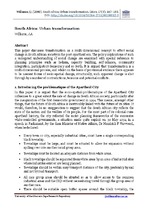| dc.contributor.author | Williams, John J. | |
| dc.date.accessioned | 2017-02-14T13:22:19Z | |
| dc.date.available | 2017-02-14T13:22:19Z | |
| dc.date.issued | 2000 | |
| dc.identifier.citation | Williams, J.J. (2000). South Africa: Urban transformation. Cities, 17(3): 167-183 | en_US |
| dc.identifier.issn | 0264-2751 | |
| dc.identifier.uri | http://hdl.handle.net/10566/2524 | |
| dc.identifier.uri | http://dx.doi.org/10.1016/S0264-2751(00)00012-3 | |
| dc.description.abstract | This paper discusses transformation as a multi-dimensional concept to effect social change in
South African society in the post-apartheid era. The policy implications of such a variegated
understanding of social change are examined with special reference to planning principles such
as holism, capacity building, self-reliance, community integration, participatory democracy and
so forth. It is argued that transformation is a multi-dimensional process, and whilst on the
basis of provisional evidence there appears to be nascent forms of socio-spatial change, structurally,
such apparent change is shot through by a number of contradictions, tensions and
potential conflicts. | en_US |
| dc.language.iso | en | en_US |
| dc.publisher | Elsevier | en_US |
| dc.rights | This is the author final version of the published article available online at http://dx.doi.org/10.1016/S0264-2751(00)00012-3 | |
| dc.subject | South Africa | en_US |
| dc.subject | Public policy | en_US |
| dc.subject | Planning | en_US |
| dc.subject | Social change | en_US |
| dc.subject | Apartheid | en_US |
| dc.subject | Post-Apartheid | en_US |
| dc.subject | Urban planning | en_US |
| dc.title | South Africa: Urban transformation | en_US |
| dc.type | Article | en_US |
| dc.privacy.showsubmitter | false | |
| dc.status.ispeerreviewed | true | |
| dc.description.accreditation | DHET | |

